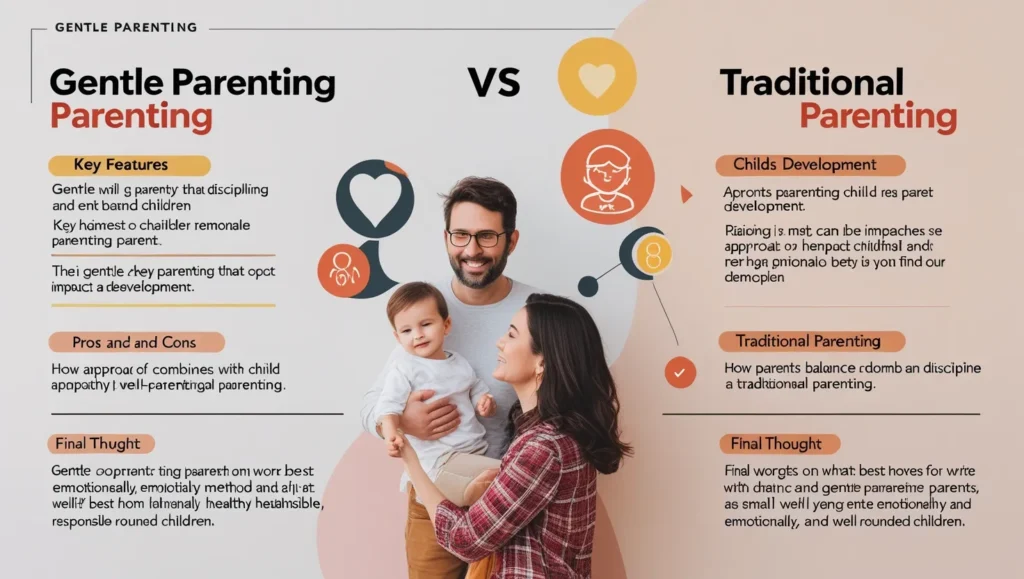Gentle Parenting vs Traditional Parenting
Parenting styles have evolved over generations, shaped by cultural norms, psychological research, and societal expectations. Two of the most commonly discussed approaches are gentle parenting and traditional parenting. While both aim to raise responsible, well-adjusted individuals, Gentle Parenting vs Traditional Parenting they differ significantly in their philosophies, techniques, and outcomes. Understanding the nuances of these approaches can help parents make informed decisions about what works best for their families.
What is Gentle Parenting?
Gentle parenting is a child-centered approach that focuses on empathy, respect, understanding, and positive reinforcement. It moves away from punitive measures and emphasizes communication and connection with the child. This method encourages parents to recognize their child’s feelings, Gentle Parenting vs Traditional Parenting validate their emotions, and guide them through problem-solving without coercion or harsh discipline.
Key Principles of Gentle Parenting:
- Respect for the Child – Gentle parenting treats children as individuals with their own thoughts, feelings, and preferences. Parents listen actively and value their child’s perspective.
- Empathy and Emotional Awareness – Parents using this approach acknowledge and validate their child’s emotions, Gentle Parenting vs Traditional Parenting teaching them emotional intelligence and self-regulation.
- Positive Discipline – Instead of punishments, gentle parenting employs techniques like redirection, natural consequences, and collaborative problem-solving.
- Encouraging Independence – Gentle parenting fosters autonomy by allowing children to make age-appropriate decisions and learn from their experiences.
- Modeling Good Behavior – Parents lead by example, demonstrating patience, kindness, and respect in daily interactions.
What is Traditional Parenting?
Traditional parenting, often referred to as authoritative or authoritarian parenting, relies on discipline, structure, Gentle Parenting vs Traditional Parenting and hierarchy. It is rooted in the belief that children should obey authority figures and learn through consequences. This approach often includes firm rules, discipline strategies like timeouts or even corporal punishment, and an emphasis on respect for elders.
Key Principles of Traditional Parenting:
- Obedience and Respect – Children are expected to follow rules without questioning authority, fostering a sense of discipline and respect.
- Discipline and Consequences – Traditional parenting uses rewards and punishments to reinforce desired behaviors, Gentle Parenting vs Traditional Parenting often involving strict consequences for misbehavior.
- Parental Authority – Parents have the final say in decisions, with children expected to comply without negotiation.
- Structured Routine – Traditional parenting follows a structured lifestyle where discipline and responsibility are instilled through routine and clear expectations.
- Moral and Cultural Values – Many traditional parenting methods are deeply influenced by cultural and moral beliefs, emphasizing duty, hard work, and social responsibility.
Comparing the Two Parenting Styles
1. Discipline and Behavioral Outcomes
- Gentle Parenting: Discipline is guided by natural consequences and problem-solving rather than punishment. Children are encouraged to learn from their mistakes and regulate their emotions. This method often results in Gentle Parenting vs Traditional Parenting emotionally intelligent children who can resolve conflicts peacefully.
- Traditional Parenting: Discipline is often stricter, with clear rules and consequences for breaking them. This can instill a strong sense of discipline but may sometimes lead to fear-based compliance rather than genuine understanding.
2. Emotional Well-being and Mental Health
- Gentle Parenting: Because gentle parenting prioritizes emotional validation, children tend to develop higher self-esteem, better emotional regulation, and lower anxiety levels.
- Traditional Parenting: While structure and discipline can provide a sense of security, overly strict or punitive methods may contribute to stress, anxiety, or rebellious behavior in children.
3. Parent-Child Relationship
- Gentle Parenting: Encourages open communication and mutual respect, Gentle Parenting vs Traditional Parenting strengthening the parent-child bond. Children feel safe expressing their thoughts and emotions.
- Traditional Parenting: While it establishes respect for parental authority, it may sometimes create a distance between parent and child, especially if the child feels unheard or overly controlled.
4. Independence and Decision-Making
- Gentle Parenting: Encourages independence by allowing children to make choices and learn from their experiences, fostering confidence and problem-solving skills.
- Traditional Parenting: While it teaches responsibility, the emphasis on obedience can sometimes limit a child’s ability to think independently and make decisions confidently.
5. Social Development and Behavior
- Gentle Parenting: Promotes empathy, kindness, and cooperation, Gentle Parenting vs Traditional Parenting making children more adept at social interactions and emotional intelligence.
- Traditional Parenting: Encourages discipline and respect, which can help children succeed in structured environments but may sometimes hinder their ability to express emotions openly.
What Works Best?
The effectiveness of a parenting style depends on various factors, Gentle Parenting vs Traditional Parenting including the child’s temperament, family dynamics, and cultural context. While gentle parenting nurtures emotional intelligence and strong communication skills, traditional parenting instills discipline and responsibility.
A balanced approach may be the most effective, integrating the strengths of both styles. Parents can adopt the empathy and respect of gentle parenting while maintaining the structure and discipline of traditional parenting. This hybrid approach can create a supportive, structured environment where children feel safe, respected, and prepared for the challenges of adulthood.
Ultimately, the best parenting style is one that aligns with a family’s values, meets the child’s unique needs, and fosters a loving, respectful relationship between parent and child.
Final Thoughts
Both gentle parenting and traditional parenting have their strengths and weaknesses. The key to effective parenting is understanding your child’s unique needs and adapting your approach accordingly. Parenting is not Gentle Parenting vs Traditional Parenting about choosing one strict methodology but rather about creating a nurturing, structured, and respectful environment for children to grow into emotionally healthy and responsible individuals. By finding a balance that incorporates both discipline and empathy, parents can ensure they raise confident, well-adjusted children ready to navigate the complexities of the world.

